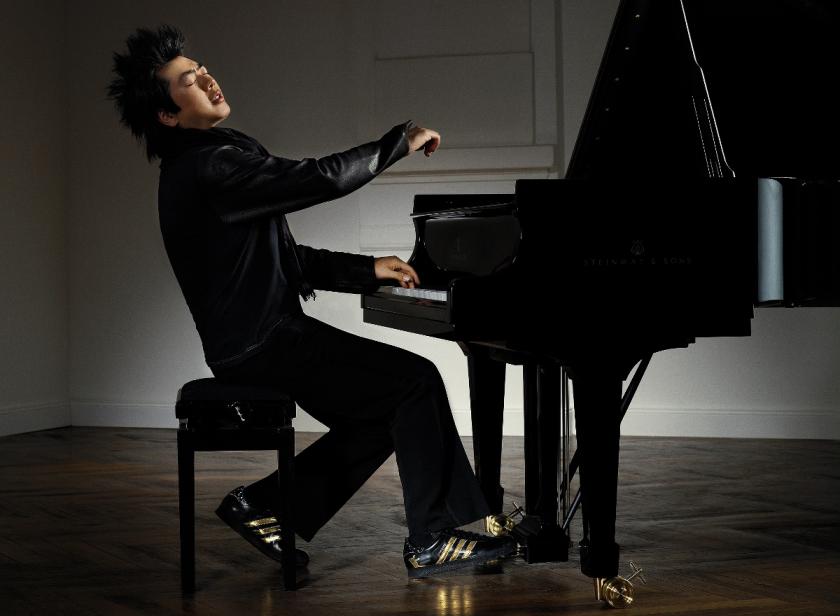The showman was back – and, bless him, he can still sell every seat in a big hall even if the programme offers close on an hour and a half of unalloyed Bach.
Lang Lang’s gifts are phenomenal: he doesn’t just play music brilliantly, every now and then he plays with it, putting his own twist of fun or pathos or bravura where few would venture to try. It can be utterly mesmerising; it can be quirky, if not exasperating. And so he did with the aria and 30 variations for keyboard known to us as the Goldbergs.
He preceded it with Schumann’s Arabeske, Op. 18, as if needing to warm the atmosphere a little before embarking on the marathon. That began almost casually, but soon he’d woven his spell, through a mix of entrancing delicacy and bursts of heavy-handedness, making the music sound almost like an improvisation at transition points and the coda as if it were written by Debussy.
Then it was the Bach. He has a vision of this as a single, developing and organic whole – broadly speaking, it became more passionate, Romantic and extrovert as it continued. He began the aria in almost mechanical fashion, not even cantabile, with just a little exploration of the inner voices in the second section. The earlier variations were more of a jolly romp than anything else, expression tempered only enough to avoid the “sewing-machine” effect, and introducing a clod-hopping dance rhythm for the first character-piece in variation 4. Number 5 is the first of several marked for two keyboards, assuming there’s a harpsichord to be played. On the piano most of them are technically tricky because of the frequent need for hands to cross over each other, and Lang Lang takes this as a challenge, almost always making them as fast and brilliant as he can. The effect is stunning in the coolness with which he can pull them off.
The second character-piece, which Bach labelled “al tempo di Giga”, was anything but rushed and sounded quite wistful. It was in variation 8 (another with hand-crossing), and the canon that follows it, that Lang Lang began to introduce a little more pedalling than before – it helps to smooth the flow of notes, of course, and enabled him to bring out the plodding nature of the lower lines with a near-staccato, for contrast, in the canon.
The fughetta variation (No. 12) was interesting: solid and forthright to begin with, more contrasted as it went on, and ending with a big thump on the final chord, and the toccata-style hand-crossing No. 13 became a near-haze of sound with freer pedalling than hitherto. The sarabande of No. 13, though, became a high-point in its restrainedly beautiful balance of melody and bass line, the gradually appearing chromaticisms studiously coloured. More lively stuff came (quite justifiably) in No. 14, and for contrast the first minor-mode variation (No. 15), with its weeping appogiature, was progressively more emotional and affecting.
To mark the half-way point, Bach gives the performer a grand French overture: this had a big sound, with plenty of pedal and Lang Lang the extrovert peeping through at last. He segued it into the two-part invention that follows, playing loud and fast and ending with a pedal-created clash of leading note and tonic, and kept up the momentum in the next variation, everything merging in a torrent of notes.
Tension relaxed in a disarmingly simple dance-style variation, a study in pedalled sonorities in No. 20, and a nobly sorrowful minor-key canon, which was completely beguiling and for the first time held the entire hall’s silent attention.
There were more tours de force to come, with clean and brilliant evenness of touch in No. 23 (but a very tricksy ending), and more pedal-created ambience in No. 24. Then the highspot of the long variation 25 arrived. It was gentle and seemed to be drawn from depths of despair – Lang Lang at his most hyper-expressive… but I felt quite sorry for him here, because (for whatever reason) his Mancunian audience produced a barrage of coughing that almost obliterated what was a real feat of sensitive pianism.
It was back to virtuosity and pure wizardry after that, and by No. 29 he was in show-off mode: pedal, thundering bass notes and all. For the “Quodlibet” last variation, with its folk-tunes, he went for a restrained, thoughtful, almost nostalgic style, and the final return to the aria saw it softer than at the outset, becoming a meditation and an epilogue.
They might have coughed through his high point, but he got his standing ovation, of course, and finished off in typical Liberace-on-steroids fashion with a couple of the sort of encores I guess some people had really come for: his Rainbow Collection from The Muppet Movie and a Chinese folk song. He can still work a crowd.
- Lang Lang plays Saints-Saëns’ Piano Concerto No. 2 and (with Gina Alice) The Carnival of the Animals with the Royal Philharmonic Orchestra conducted by Mark Wigglesworth at the Royal Albert Hall on 21, 23 November
- More classical reviews on theartsdesk













Add comment